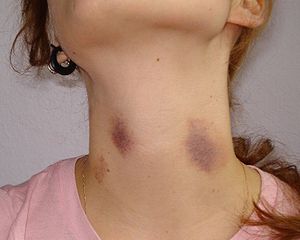Hickey
| Hickey | |
|---|---|
| Other names | Kiss mark, love bite, bug bite |
 | |
| Hickeys on the neck. | |
| Pronunciation |
|
A hickey, hickie or love bite in British English, is a bruise or bruise-like mark caused by kissing or sucking skin, usually on the neck, arm, or earlobe. While biting might be part of giving a hickey, sucking is sufficient to burst small superficial blood vessels under the skin.
The origin of the word is from its earlier meaning of "pimple, skin lesion" (c. 1915); perhaps a sense extension and spelling variation from the earlier word meaning "small gadget, device; any unspecified object" which has an unknown origin (1909).[1]
Hickeys typically last from 5 to 12 days and may be treated in the same way as other bruises.[2] Ways to reduce the appearance of hickeys include icing recent hickeys to reduce swelling, rubbing them with a chilled spoon to remove the bruise, and applying a warm compress to older hickeys to dilate vessels and promote blood flow.[3] They can be covered with a concealer or powder corresponding to the sufferer's skin tone, or a fake tan. Alternatively, articles of clothing such as scarves, snoods, turtle necks, or sleeves may be used to conceal hickeys.
References[]
- ^ "hickie - Origin and meaning of hickie by Online Etymology Dictionary". www.etymonline.com.
- ^ "How Long Do Hickeys Last". ownarticles.com. April 15, 2016. Archived from the original on 2016-05-20.
- ^ Amar, Charu (2009-11-06). "Ouch! That's a lovebite!". Man-Woman Relationships. The Times of India. Retrieved 2010-01-18.
External links[]
| Classification |
|---|
- Injuries
- Sexual acts
- Injuries of neck
- Medicine stubs